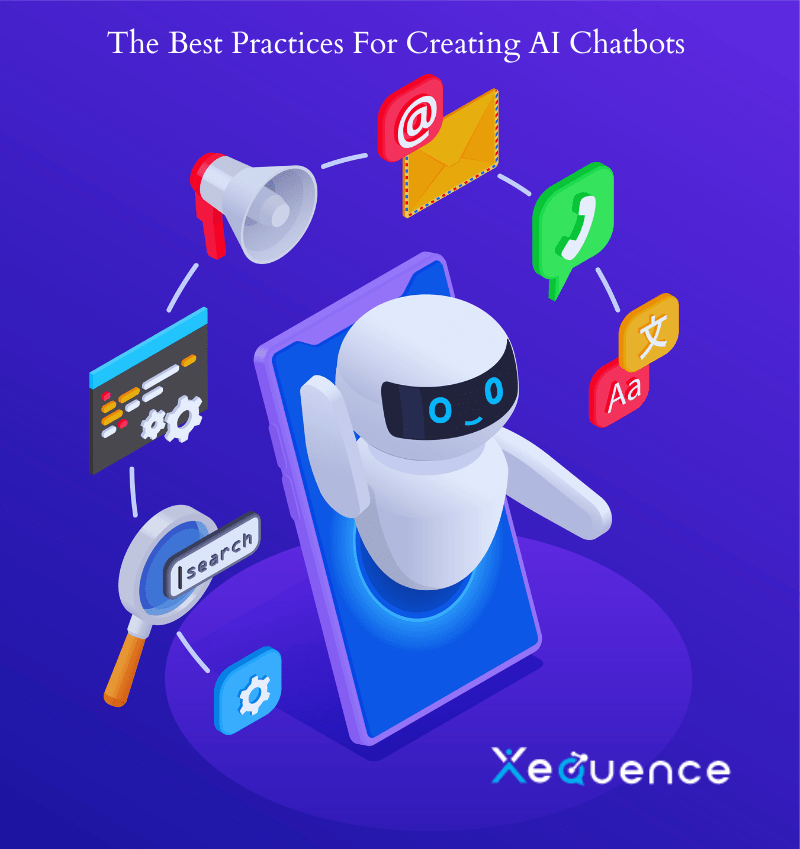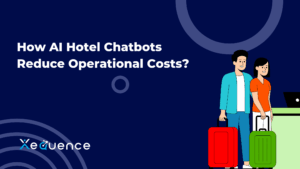- Home
- Artificial Intelligence
- 5 Things You Need To Know for Building Automatic Chatbots
5 Things You Need To Know for Building Automatic Chatbots
- December 12, 2023
- XequenceAI
- Artificial Intelligence

The Best Practices For Creating AI Chatbots
Understanding chatbot best practices is important for you if you are associated with the hospitality business. A chatbot is a software program or web interface that is developed to mimic human conversation through voice or text message interactions. As these are capable of offering useful and relevant information or support, chatbots provide a great user experience. The use of artificial intelligence-based software solutions delights the customers and results in improved outcomes for the companies. We have done a lot of research and come out with a set of practices that will help you in creating AI chat assistant for hotel and resorts.
Types of chatbots used in the hospitality industry
- Website bots
- Social media chatbots
- Messaging services chatbots
- Voice assistant chatbots
- Customer support
- Sales and marketing chatbots
Why does your business need AI chatbots?
The market of conversational AI market is expected to reach 18 billion dollars by the end of 2027. Conversational AI, based on NLP and machine learning, allows machines to understand and respond to human language. It converts human conversations into languages that machines can understand. With the ever-increasing growth of AI and ML in the technology world, hotel chatbot integration is getting more attention across the hospitality industry. These applications come with the ability to engage the workforce, deliver best experiences, improve brand reputation, and increase customer satisfaction. A properly designed bot can develop trust and build confidence among the users. Hence, such solutions invite the users for more sales.
Difference between chatbots and conversational AI?
The market of conversational AI market is expected to reach 18 billion dollars by the end of 2027. Conversational AI, based on NLP and machine learning, allows machines to understand and respond to human language. It converts human conversations into languages that machines can understand. With the ever-increasing growth of AI and ML in the technology world, hotel chatbot integration is getting more attention across the hospitality industry. These applications come with the ability to engage the workforce, deliver best experiences, improve brand reputation, and increase customer satisfaction. A properly designed bot can develop trust and build confidence among the users. Hence, such solutions invite the users for more sales.
Difference between chatbots and conversational AI?
As we said earlier, AI-powered hotel service bots stimulate human conversations to create better experiences for customers. These software programs create better experiences for customers. Some tasks or operations are based on predefined conversation flows to send automated responses in real-time, while some others make use of AI and natural language processing.
Nevertheless, conversational AI is an AI-driven communication technology that includes chatbots and virtual assistants (e.g., Amazon Alexa). This is a broader term which helps businesses recognize vocal and text inputs, facilitate conversational flow, and mimic human interactions.
What are the best practices for creating AI chatbots?
- The first thing is to identify the purpose and scope of a chatbot before we make any step to design it. It helps us to define the goals of a chatbot and ensure it meets your customers’ specific needs. Take time to understand the needs of your customers and try to build a chatbot that provides accurate, efficient, and engaging responses.
- Design a visually appealing user interface after you understand the chatbot’s target audience, purpose, and brand identity. The design needs to be easy for your customers in recognizing and interacting. Hence, you will be able to capture the user’s attention and ensure the chatbot experience is enjoyable.
- The chatbot you are going to design should be trained and tested. You need to teach it the way to respond to user requests and provide relevant information to them. Go for training that is based on machine learning. Also, test its performance thoroughly before releasing it to users.
- Do not forget there are situations when such software solutions don’t understand our needs or answer our questions. So, you are advised to provide an all-in-one handoff to human agents. However, the human agents should be aware of the conversation history to better assist the users.
- Ensure the chatbot is delivering the anticipated results by monitoring the performance. To do that, you will have to fit the metrics like user engagement, response time, work accuracy, and customer satisfaction. These things can provide you with valuable insights into user preferences and behaviour.
The future of chatbots
Now, chatbots are human-like and futuristic. The advancements in machine learning and natural language processing are helping these software solutions to analyze vast user data and mimic human interaction closely. With the use of these hotel booking chatbots, companies are now offering highly personalized responses and recommendations. Here are a few benefits of AI messaging applications.
- Ensures 24*7 support services
- Makes the conversation technique easier
- Drives chatbot behaviour by providing in-depth customer insights
- Accurately mimic human interaction
- Delivers great experience to the customers
These applications will play a visible role in reshaping the after-sales support and customer care services from the hospitality industry. As these are enabling users to interact with chatbots using voice commands, Voice Assistants are gaining worldwide popularity. As the business world is evolving, artificial intelligence has become an integral part of many sectors, including hotels and resorts. By streamlining operations, these applications are gradually shaping the future of business-customer interactions. Hence, the businesses will be more capable of delivering personalized services to their clientele.
Recent Posts
Newsletter
Get regular updates on data science, artificial intelligence, machine
You may also like

AI Travel Assistants: The New Personal Travel Planners

5 Things an AI Travel Assistant Can Do in Seconds

How AI Hotel Chatbots Reduce Operational Costs?




